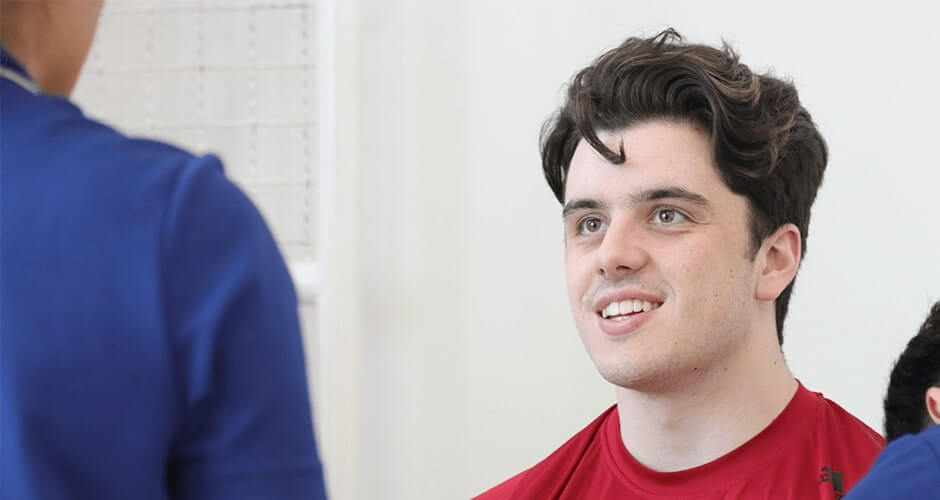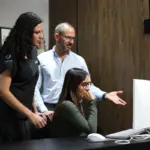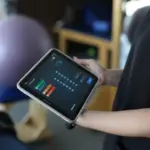Ryan Straschnitzki’s spinal cord injury recovery journey with epidural stimulation began in 2019. He sustained his injury in early 2018, after he was involved in the Humboldt Broncos bus crash, an awful accident which occurred as his team traveled to an ice hockey game. He came to Bangkok, Thailand late in 2019, to receive Epidural Stimulation treatment and his treatment process was followed and documented in an interview series with members of the Verita Neuro team. The first interview was a discussion with Director of Patient Services, Hanna Charles, where they discussed his early experiences with the treatment and the build up to it.
All the therapists here, they're very innovative, they care about you, they like to think outside the box and dedicate their time to your therapy.
Edward
Hello, everyone. This is Hanna from [Verita Neuro]. I'm here with Ryan today. Please can you introduce yourself for those of our guests who do not know you?
I'm Ryan Straschnitzki, from Canada. And I was in a hockey bus crash and ended up getting a spinal cord injury. Before I came here, I wasn't able to move anything below my chest, because I had a T2 incomplete spinal cord injury. I've had a positive attitude and hard work, as well as support from around the community so I think it has helped me come a long way, being here. It’s been roughly a year and a half since my injury.
How was your experience in Canada with hospitals and doctors? Is there a lot of awareness for SCI patients?
It's tough for spinal cord injuries in Canada, because our health care system is kind of lacking in that area. Everyone's kind of treated the same, whereas in reality each injury is a little different, so people need different care for certain things with spinal cord injuries. I think outside of Canada, everything seems to be up to par and it's really good. So I think it's a good wake up call for sure.
What were your initial thoughts when you learned about epidural stimulation? Had you heard about it from early after your injury or is it something you discovered later on?
I found out through my physio place and Dr. Richie Gill [a Calgary based surgeon who underwent epidural stimulation in 2019]. I thought the science was pretty incredible. I've watched videos and testimonials so I knew it was pretty promising. I didn't know it was in Thailand, but you know, happy I came and it's been great ever since.
Were you a little hesitant in the beginning? Did you have any fears about coming here?
Yeah, I was a little nervous at first. I mean, it's a long flight and I’d be pretty far away from home for about five weeks so I was a little skeptical. Also, I wanted to come when it wasn't too hot - being from Canada, my dad can’t handle the heat too much and he was always going to come and be my treatment partner. But I’m so glad I came now and I haven't looked back since.
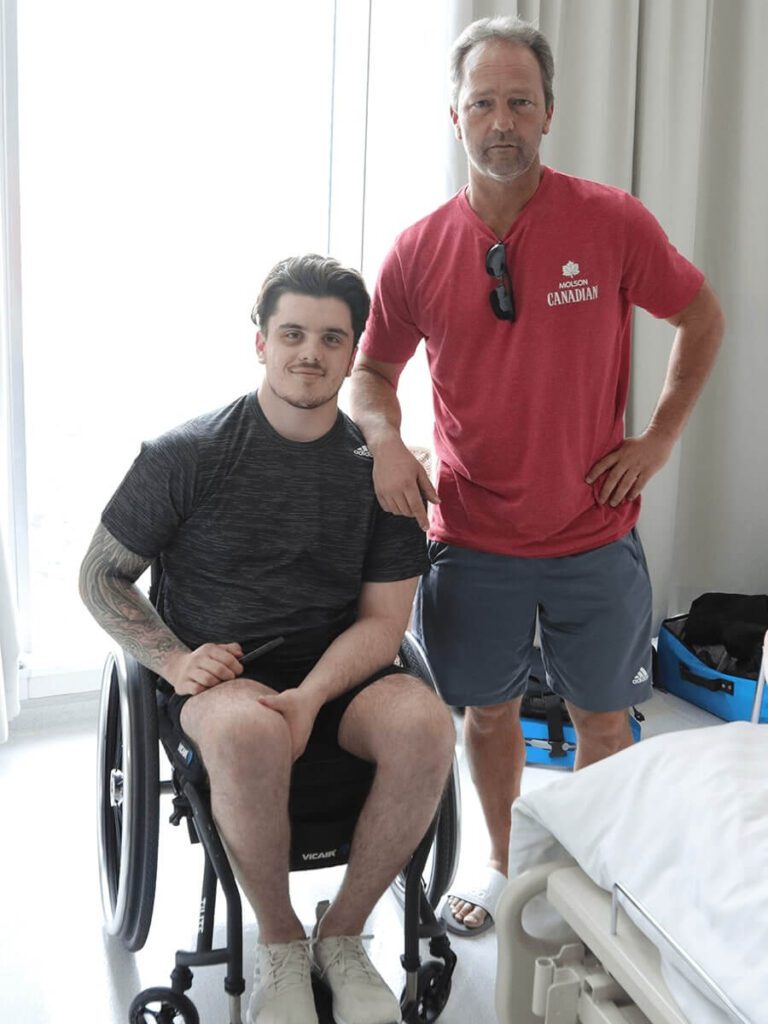
Is it how you expected, regarding the hospital and everything?
Yeah, I mean, so far, so good. I haven't really been out to explore yet, I've been here doing a lot of physio and mapping. But I know once my back is healed from surgery, I'm able to get out more and I know there's a local hockey rink in Bangkok somewhere. I got invited out to go and play some hockey.
Yes, we are hoping for that as well. Especially as we are working on your core control, which will be quite helpful for you going forward. I know it's your goal to join the team and play ice hockey on sledge.
Yeah, the Olympic para ice hockey team in Canada, so if I can get anything back, I think that'll be huge.
Since you’ve come here you've had initial improvements, but you've gained quite a bit. We have your hip flexion and extension, knee flexion and extension and ankle as well. So how does it feel? What are your thoughts about it? Was it a shock for you to see it even though you were expecting this?
Yeah, it was a huge shock and an eye opener for sure. I mean, I can't necessarily feel what is happening but I'm trying to send those brain signals down to my limbs to get them to go! Sometimes it works, sometimes it doesn't but it's about practicing working on them.
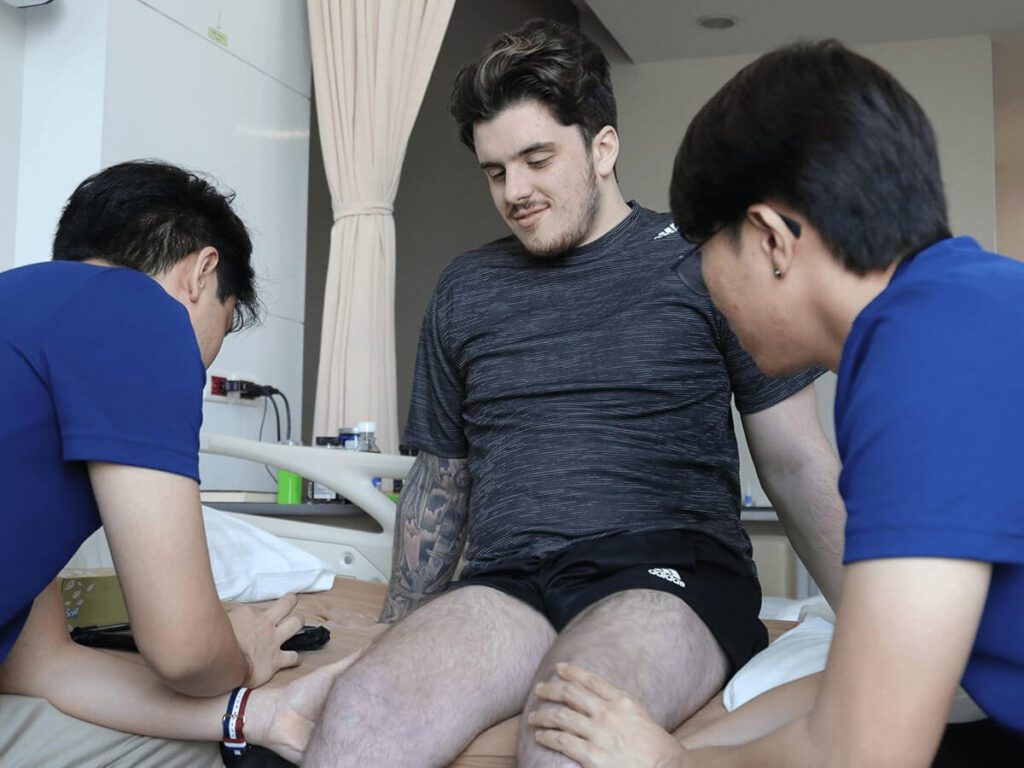
It is a complicated process. We're in the middle of mapping now which takes many hours - we're working with you maybe 4 to 6 hours every day. I know that you're expecting to do some more exercises by yourself and some more training, but it's difficult to squeeze it in, isn't it?
Oh, yeah it's tough. I mean, after the mapping and after a long day, you're kind of tired. So normally, I would go and work out or lift weights but I’ve gotta watch out for my back and at the same time I'm pretty tired. The mapping team is quite strict about my schedule.
So in terms of your goals, I know core is important. But is there anything particular you expect from the treatment?
Just to get as healthy as I can. I know there's a person here who was able to stand up on his own with a walker so I think that's something to look towards and set my goals towards. If I can manage to do that by the end, then I think I'll be pretty happy with myself.
I think next week, we are planning to start the stepping program with you. It's a lot of work, many hours every day will be spent working on the mapping and device programming. But towards the end of your stay, we should be able to see a good range of improvements, which will be very functional for you.
Is there any message you would like to convey to other spinal cord injury patients watching you in Canada and all over the world?
Yeah, I've received a lot of questions on my social media. I wish I could answer them all. Coming for the epidural stimulation here in Thailand has helped tremendously and I know it's going to impact my life positively in the future. If they have any questions, I think this is the place to reach out to and this is awesome.
We’d like to answer questions about how the therapy is done.
This is a neurosurgery where we have implanted a small electrode connected to a battery computer into Ryan's body, below the injury level. So to explain the general mechanism of how it works - the electrode is recognizing the signals from the brain which because of the injury are not strong enough to cause any functional movements. The small computer inside the body then amplifies it to deliver it back to the nerves and supply it to the legs. We are hoping to see voluntary movements in the beginning and the control of those movements is something we need to work on. We have a lot of training and a lot of exercises which we use to achieve good results in terms of muscle control and voluntary functions.
So Ryan, when do you think you will be able to start sports again?
As soon as my back heals up, so hopefully another week off then right back to it. I’m hoping to visit the ice rink here maybe sometime next weekend. I feel changes in my core control sitting, I’m able to balance myself, which will be one of the most useful things. I’m very grateful to be here.
Great, thanks Ryan. Next week, we will be back for an update and hopefully we will be able to share the updates from Ryan’s first stepping sessions so we're all very excited about it and looking forward to seeing more improvements in your case.
The above is not a verbatim transcript of Ryan’s interview and the exact wording and order of words have been edited to be read more easily. You can watch the full interview on our YouTube channel.

